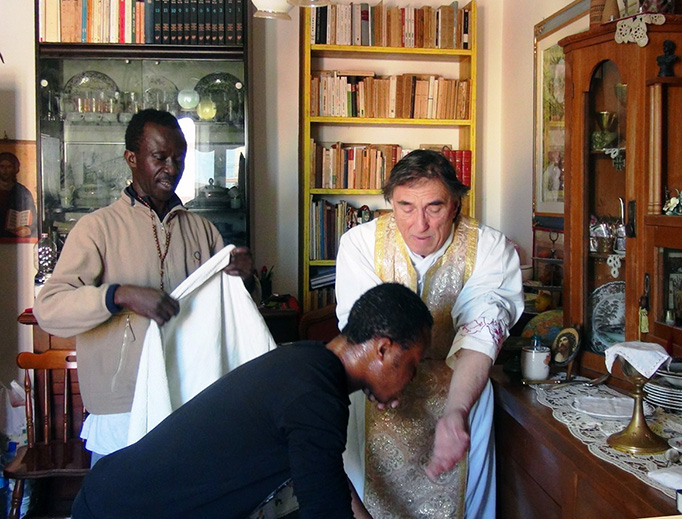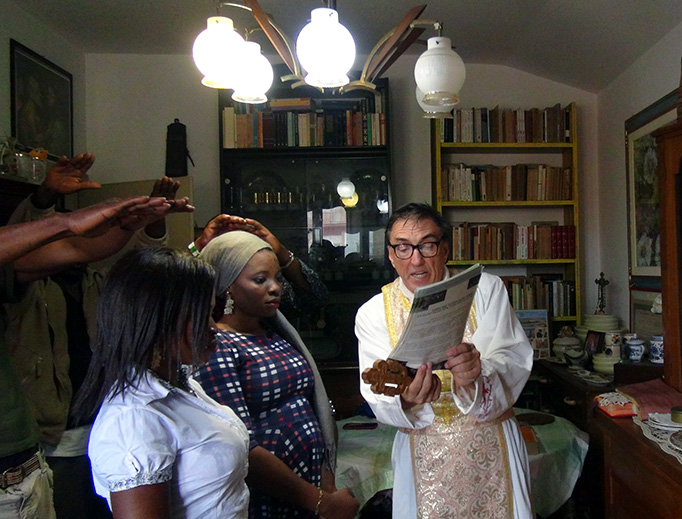African Refugees Embrace the Catholic Faith in Rome
“I’ve been a priest for over 35 years, but I have never seen the intensity of prayer, of devotion, of reverence, as I have from my African children.”

Earlier this year I met migrants from Africa living in and near Rome, spiritually sustained by a humble priest, willing to meet anyone, any time, for counsel, encouragement, catechism, and sacraments.
Before discussing his work, Fr. Linus Dragu said it was more important to hear an account of the harrowing crossing from North Africa to Italy from a man who made it.
Charles Gyamfi, 34, is a Ghana-born migrant who survived the journey from Tripoli, Libya, to Lampedusa, Italy in an old fishing boat packed with hundreds of people in 2011.
“Storm waves sent my side of the boat up into the air, and we cried, ‘Jesus, save us!’ because we were all Christians,” Charlie remembered.
“Then Muslims on the other side of the boat shouted: ‘Allahu Akbar!’ as they flew up into the air, while our side came crashing down,” the slender man said, shaking his head.
“Being so close to death, seeing terrible things, you never forget,” he said. “But I can laugh a little, thinking of the Christians and Muslims, taking turns pleading with God.”
Charlie made it to Italy with 347 other people, transported on a two-level fishing vessel commandeered by smugglers in Tripoli.
Journey by sea from Libya to Italy is a deadly path for migrants: Last year, 5,096 people died trying to get to Italy, according to the United Nations High Commission on Refugees, while 181,436 people made it—almost a three percent casualty rate, yet 2016 saw an 18 percent increase over 2015 in migrants using this dangerous route.
“It was death in the chaos of Libya or escape by sea,” he said solemnly.
Tripoli: From Fine to Terrifying
Charlie explained to a group of friends sipping coffee after Sunday Mass (35 minutes north of Rome by train, where housing is cheap) what compelled him to leave Libya for Europe.
At age 12, in about 1995, the Ghanaian boy was sent by his family to work for friends as a house servant in Tripoli.
“The family treated me well. They were good people. Muslims. They paid me and I was able to send money home,” which was, in fact, the point of sending a child so far away.
Raised as a Catholic, Charlie said most Christians in Libya worship together in private homes despite the existence of cathedrals in Tripoli and Benghazi.
“You have to be careful in Muslim countries not to offend anyone. I wouldn’t wear a cross or have a rosary,” he said.
He remembers worshiping discreetly with other workers, mainly Chinese Catholics, despite the lack of a priest.
Once NATO began bombing Libya in 2011, there were few escape routes—which is when smugglers stepped in, selling space on boats to get out.
Luckily, the Italian navy apprehended Charlie’s flailing fishing boat about 50 km away from the island of Lampedusa, Italy’s most southern land.
As part of the first wave of people fleeing conflict, Charlie was sent to a refugee camp, than relocated to a town on the coast north of Rome.
Salvation
Charlie started looking for a Catholic Church right away. He met Fr. Dragu, a chaplain to prayer groups in the Italian port city of Civitavecchia. Why was it so important to rekindle faith?
“I knew I had to change my life, and prayed to God that he forgive me for the sins I made in Libya,” Charlie quietly explained.
“In chaos, many different things happen, not good for Christians. For example, someone says, ‘help me,’ so you take the money, but you can’t do the right thing, so it is a lie, a form of theft, to take money.”
That’s when Fr. Linus widened our focus: “I’ve been a priest for over 35 years, but I have never seen the intensity of prayer, of devotion, of reverence, as I have from my African children,” he said.
The priest has baptized over 1,000 refugees from Africa—from Nigeria, Benin, Ghana; Niger; Kenya; Mali; Chad, and Gambia—over the last three years, many who were brought up sympathetic to Christianity but without the sacraments.
On his computer desktop is a folder with all the certificates he has given, for marriage and confirmation, Holy Communion and baptism.
He mentioned another cleric dedicated to Africans and Middle Easterners in Italy who inspired him: Melkite Greek Catholic bishop Hilarion Capucci, who catechized, bestowed sacraments, and even ordained several men to minister in the community. He died in January at age 94.
Bishop Capucci, born in Aleppo, Syria, played for many years a significant role between Christians and Muslims in the Middle East. In 1980, from Rome, Capucci visited several times with the American hostages in Iran. He negotiated the release of American soldiers bodies who died in the rescue mission. The cleric also negotiated a plan for the release of the 50 American hostages, which failed because it was leaked to the French press before the Iranian parliament’s approval.
From all over Italy, and beyond, people find Fr. Linus because they have heard he will teach them and initiate them into the faith, said Charlie, who now helps with evangelizing and bringing new souls to the Church.
Nigerian-born refugee Promise, 32, (in Italy via Libya then Hungary) explained, “God will repay Fr. Linus. He lives to help us. He is fulfilling the Word of God.”
“I’m a missionary in Italy,” shrugged Fr. Linus, who describes this ministry as the most uplifting form of service to God he has ever undertaken.














